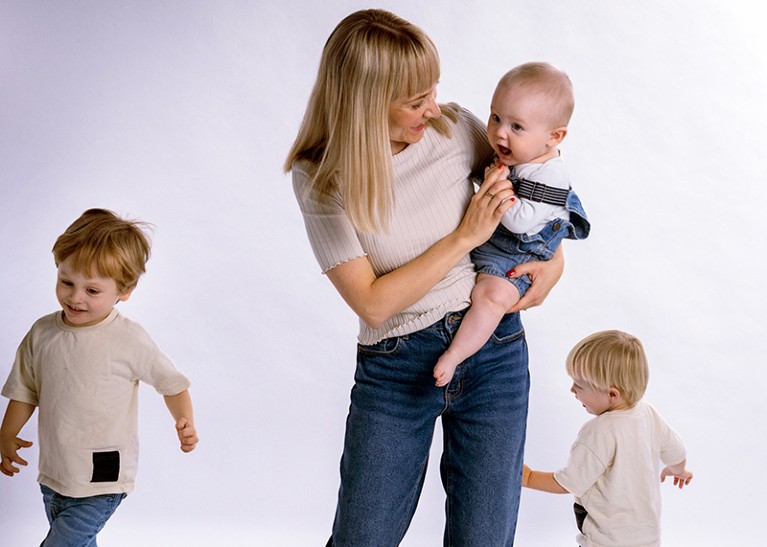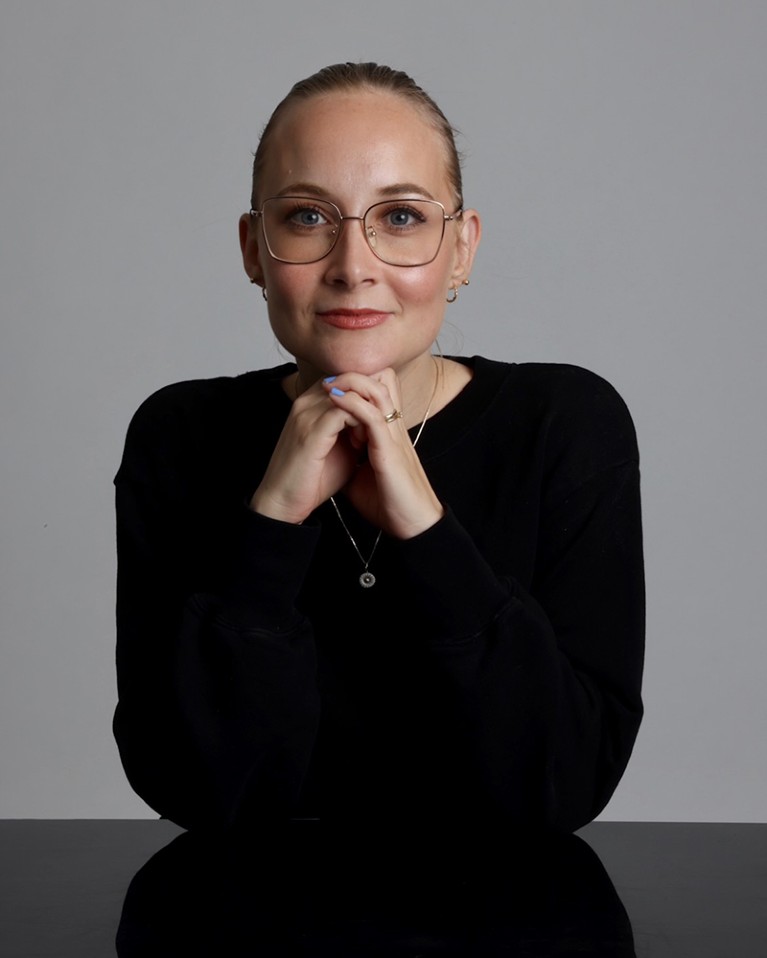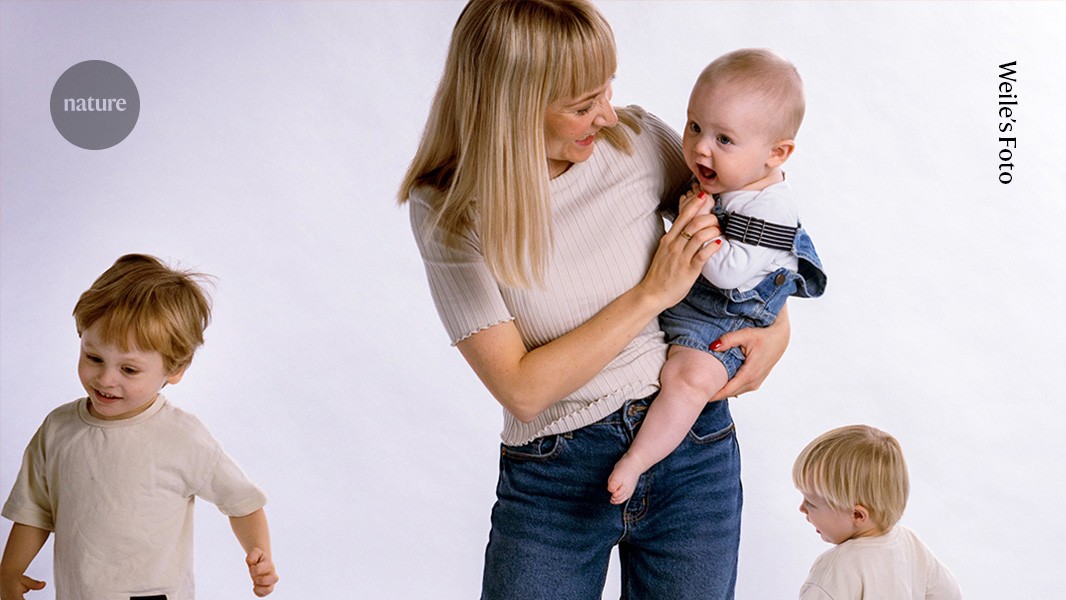
Cecilie Steenbuch Traberg’s three children were all born while she worked towards her PhD.Credit: Weile’s Foto
I’ll never forget when I was sitting in a lecture hall, overhearing fellow students behind me discussing how having a baby during graduate school is “career suicide”. When I stood up, revealing my 30-week bump, their shocked expressions spoke volumes. The academic path is often framed as a strict sequence: first establish your career, then consider starting a family (or, as some scientist parents might say, making a ‘tenure baby’).
But life doesn’t always follow a neat timeline. My husband, a biotechnology PhD candidate at the time, lost his mother at a young age — which made us want to start building our family sooner rather than later. But in 2019, at 26, I found out I was pregnant — a planned milestone, although it came much earlier than expected. I was one week into my four-year psychology PhD programme at the University of Cambridge, UK, and my emotions were in a whirlwind. I was overjoyed, yet riddled with anxiety; I was thrust into thinking about motherhood while working as an early-career researcher.
In the end, that pregnancy wasn’t a one-off; I would consciously choose this journey twice more during my PhD programme. I gave birth to my first son in June 2020, not even a full year into my programme. My second son came in December 2022, midway through my third year, and my third son was born this March, midway through my fourth and final year.
Facing judgement and justifying choices
In my department, the only professors I knew were either men or childless women, and I feared that I would be labelled as ‘unserious’ about my career. Although my supervisor was supportive through and through, not everyone shared his perspective. It seemed, at least from the outside, that everyone around me had made sacrifices — whether delaying having children, living away from their partner or not pursuing romantic relationships because of the demands of academia. I was concerned that deliberately choosing a different path could be perceived as a lack of dedication — as though I wasn’t committed to making the same sacrifices as everyone else — so I sometimes allowed people to think my first pregnancy was unexpected.
Juggling scientific careers and family life
Mixed reactions from colleagues and peers underscore the systemic challenges that parents face, especially with parental leave. Deciding whether to take time off comes with pressures: you either lose months of progress or push through and attempt to work during what should be time off to care for your new baby.
I often faced near-impossible choices. For example, a book editor noticed a public lecture that I delivered in 2019, and I was invited to write a chapter for an academic book being proposed to a publisher. I accepted the invitation, expecting the project to progress quickly, but the proposal wasn’t accepted until four years later — right before my second baby was due. This left me with a difficult choice: complete a complex, career-crucial piece of work while caring for a newborn and my older son, or turn down an opportunity in which I had invested so much effort.
Similarly, around my due dates I received long-awaited revisions for several papers that I had submitted to journals, forcing me to tackle extensive edits while on parental leave. Many of my projects involve programming, and debugging code on just four hours of broken sleep, with a fussy baby on your chest, is no easy task. Although editors granted limited extensions, they couldn’t accommodate the full length of my leave. I even interviewed for postdoc and tenure-track positions until two days before giving birth for the third time, swollen and battling pre-labour contractions. At just two weeks post-partum, I was preparing lecture demonstrations and research talks. Securing a position before my leave ended felt like a necessity, because my third baby’s due date was very close to my PhD due date.
The hidden cost of stepping away
Parental leave isn’t just a short-term challenge; the professional toll of stepping away can be hard to recover from. In my case, I was fortunate to be able to take three rounds of six months’ leave.

Cecilie Steenbuch Traberg is determined to make it easier to combine motherhood with working as an early-career scientist.Credit: Cecilie Steenbuch Traberg
During each one, my papers lost relevance: new studies were published in my absence, and reviewers questioned why I hadn’t cited these papers. I wasn’t able to take on leadership roles in grant-based or industry-collaborative projects, because these roles required continuous involvement that wasn’t feasible during my extended breaks — breaks that my supervisor had fully supported. However, this raises a broader question. In academia — unlike the corporate world, where someone might temporarily step away from heading a project and return to their role later — taking time off can mean losing out on leadership opportunities entirely. Securing higher levels of authorship in collaborative projects also became challenging. For example, during an intense period of one project, my 11-month-old’s bronchitis led to a hospital stay, limiting my ability to contribute at a key moment. As a result, my peers, who could work without such interruptions, earned higher authorship positions on the basis of the amount of work they did. This is completely fair — they did more of the work — but the situation reflects how much harder it can be for those with caring responsibilities to compete in fast-paced environments that often reward not just the people who contribute first, but those who can consistently commit to fast turnarounds and demanding deadlines. In academia, publications and authorship are the currency of the job market, and these missed opportunities can accumulate over time.
Focus and perspective
Yet amid the chaos, sleepless nights and seemingly impossible juggling of responsibilities, there’s an undeniable beauty to having children during your graduate studies. The demands of parenthood forced me to become laser-focused, making every moment at my desk precious.
The parenting penalties faced by scientist mothers
And, more than just boosting my productivity, my children have brought a profound sense of perspective to my academic journey. The sting of rejection — be it from a journal, a grant committee or a conference — fades quickly when met with your child’s infectious laughter. Furthermore, being a graduate student, for all its pressures, comes with a level of time flexibility found in few other stages in life. Yes, deadlines loom and research is demanding, but you can structure your day around both your work and your children. This flexibility has allowed me to be there for the small, yet significant, moments in my children’s lives — which I might have missed in a more standard 9-to-5 job.
Time for a rethink
Navigating the challenges of raising three children as a graduate student has made it clear to me that both cultural and structural changes are essential to support scientist parents. Structurally, academia must stop treating PhD candidates as ‘students’. Few other industries label their entry-level staff in training in this way — much less underpay them or place so many stipulations on them.
Being a parent is a hidden scientific superpower — here’s why
In my final year, my funder began offering an allowance to help cover childcare costs — this is a step in the right direction, but it is the bare minimum. Funders must ensure that financial support includes paid parental leave; no grant or stipend should be awarded without it. And universities must find ways to subsidize childcare costs significantly for graduate students. People in PhD programmes and postdocs should not have to navigate the gruelling job market and secure a tenure-track position before they even consider starting a family. Right now, only those with extra financial or caring support get to choose whether to have children before reaching stability in their career.
Ultimately, balancing motherhood with graduate studies shouldn’t be this hard. We need to ensure that the next generation of scholars can choose both a family and a fulfilling academic career, without feeling as if they must sacrifice one for the other. We need a system that fully supports academic parents. Inspired by my own supervisor, and as a future principal investigator, I am committed to making that change a reality.





